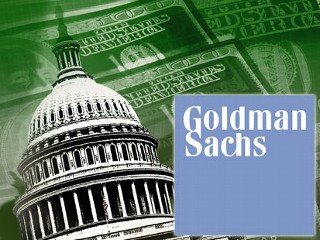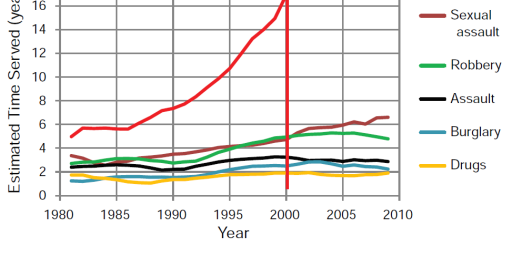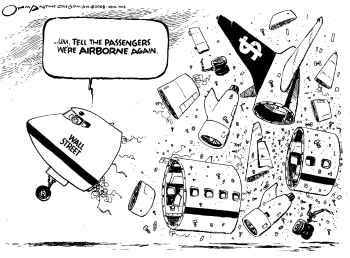Skilling, Enron, and the Justice System
Stetson University law school dean Ellen Podgor wonders whether it’s fair that former Enron CFO Andrew Fastow is getting a radically reduced sentence for testifying against his corporate superiors, thereby essentially punishing those who elected to exercise their Constitutional right to a jury trial. He also wonders if prison is even the most appropriate way to punish non-violent, white collar criminals.
This prompts and outraged response and mockery by Berkeley economist Brad DeLong, who calls these “stupid questions” and a defense by Economist business journalist Megan McArdle.
Like McArdle, I have followed the case only peripherally, so I have no strong views one way or the other on what punishment Fastow deserves. In the broader sense, though, I agree with her (and, one presumes, Henning) that there is something perverse about the state offering incentives to criminals to testify against others accused of crimes. If one is getting the promise of liberty in exchange for the conviction of one’s fellows, one has a strong incentive to embellish.
As she notes, this matter is especially problematic in cases involving highly technical legal issues.
[T]he odds that a jury of laypeople have correctly decided a complex securities case cannot be greater than random. I sincerely doubt that Mr Delong or I could master enough of the correct securities law, accounting procedure, and evidence in the case, to turn in a good verdict within the required timespan; I am quite positive that my mother, aunt, best friend, dry cleaner, and building superintendant–good and clever people all–could not.
Her analysis of the result of this information deficit matches my own:
Once indicted, it seems obvious to me that Skilling and Lay were bound to be convicted simply because they were the public face of an enormous financial disaster–not because 12 solid citizens soberly acquired the equivalent of a Phd in financial accounting, and after carefully weighing the evidence, determined that these two gentlemen deserved to go to jail. This may be the correct outcome, but it had nothing to do with the process; it was predestined–written, as the Calvinists say, at the beginning of time. So why give Fastow a break on a case that was already a slam dunk? I find it troublingly possible that prosecutors needed Fastow’s testimony not to convict his equally guilty bosses, but for window dressing: the minimum veil of decency that allowed us to pretend we were not basically witnessing a show trial.
My instinct in these matters is that, given the enormous amount of shady dealings at Enron, Skilling and Lay either knew or had a duty to know something wrong was going on. Still, jurors generally start with the view that indicted people are “probably guilty” and that’s geometrically more true for celebrity defendants already convicted in the press months or even years before jury selection. Having a co-conspirator as a government witness makes that even more likely.
As to the appropriateness of prison as a punishment, I generally think it should be reserved for violent criminals whose liberty would be harmful to the public. In most white collar cases, some combination of restitution, community service, and loss of licensure is more productive. I’m less certain of that, though, in cases where large numbers of people have been bilked out of millions of dollars. DeLong may be right that retribution for its own sake is important in those cases.
Correction: I originally attributed Podgor’s post to her co-author, Wayne State law prof Peter Henning.






The incentive and disincentives for snitching is classic game theory and the “Prisoner’s Dilemma.”
http://en.wikipedia.org/wiki/Prisoner's_dilemma
Basically if both Fastow and Skilling didn’t cooperate and state probably would not have nad success they both would have copped relatively short sentences. However, Fastow flipped and copped to an even shorter sentence while Skilling didn’t cooperate, thereby exposing himself to the very long sentence.
Yep. Of course, classic Prisoners’ Dilemma presumes both people are equally guilty and that the confession is truthful. It gets a little more complicated in these kind of cases.
As she notes, this matter is especially problematic in cases involving highly technical legal issues.
This bothers me a bit more when two punks knock over a convenience store, one of them kills the cashier, and then whichever one’s a tad brighter points the finger at the other to escape the death penalty–whether he’s the killer or not.
But since we seem to tolerate that kind of thing, I’m not shedding any tears for the Enron boys, who would be staked out in the desert next to a scorpion nest, if they got what they deserved.
James, I don’t have much doubt both Fastow and Skilling are equally guilty of their crimes.
DC Loser, you have just proven Ms. McArdle’s point about destiny…Anderson, sober up bud.
You assume that the intent of the system is to actually determine & punish guilt. I, jaded bastid that I am, look at the trend over the last several years (and yes, I’ll even admit it predates Bush :-), and see that image is truly triumphing over substance. Punishing the guilty is no longer the main goal of the system (or at least those running the system) – it’s all about _looking_ like they’re doing something. Giving appropriate (or even effective) punishment to the guilty is purely an occasional side effect…
I still think we are ignoring the responsibility of the Board of Directors. These are the people elected by the shareholders to oversee the operations of the company. Where were they in all of this? Collecting a paycheck and doing nothing?
I would have to agree that hard prison time is not the best way to punish these men. Get something out of the talents that they do have. Make them give back to society or the people the screwed in one way or another.
I would have to agree that hard prison time is not the best way to punish these men.
It always escapes me why white men in ties who steal from their own companies don’t need to go to prison, while black men in T-shirts who steal from other people’s companies do need to go to prison.
But perhaps Mr. Plunk believes the latter, too, should be giving back to society with their talents.
(Frank: of *course* I have a double Maker’s Mark in my coffee every morning. How did you guess? I hope my boss isn’t as sharp as you!)
Didn’t mean it offensively Anderson. I apologize if it came out that way…And to answer your question, my guess on your condition is based on your comments. I assumed that only a drunk would wish harm on people he knows nothing about. My mistake if indeed you are sober, I just thought psychopath was a little too strong.
One of the parts about prison being the appropriate punishment is that you don’t want the punishment to be just a part of doing business. Imagine if we had a law that said “pay back all your ill gotten gains an we shall set you free from any white collar crimes”. So now the white collar criminals will not profit from their crimes. Except we don’t catch all of them. The calculus would be that x% chance of being caught. 100% retention of funds if not caught, 0% if caught. Gee, which is the smarter thing to do? And when you get in to the “punishment” being a restitution of 1 or 2% of the profits/ill gotten gains, it really becomes just a cost of doing business. Plus the people who do white collar crimes are likely to think they are smarter than the average bear, so their chance of getting caught would be less than the general odds.
If you add in some community service (how much, what kind, consulting for minority business start ups count?) and loss of licensure (where do you get a license to be a CEO anyway), you make the calculus a little harder because it isn’t straight financial. But the principle is the same. In this case, we are talking about tens of millions of dollars. That provides some powerful incentives. Heck, just hide the money well enough so that you can claim to give back “all that’s left” would make keeping just 10% pretty attractive.
I’m not willing to make the death penalty mandatory for white collar crime (as you point out, prosecution of these things is complicated enough), but I would suggest that making the punishment something that people would not want to risk would have a much more deterring effect than making it just a cost of doing business.
I assumed that only a drunk would wish harm on people he knows nothing about.
Agreed. And why would I know nothing about men who have been very publicly convicted of terrible crimes?
Just kidding about the scorpion part, though. The desert sun should do the trick.
Steven,
I agree with the idea that their talents should help those that they harmed, but I still believe prison may be the only way to actually deter them. As for their talents, they invariably revolve around making more money for themselves, so why shouldn’t restitution, even to the point of bankruptcy or significant future-wage garnishment be part of it as well?
And you’re quite correct about the Board’s culpability. Unfortunately, it is still perfectly legal for corporate executives to simultaneously _be_ board members – I strongly believe that this is a guarantee of criminal activity. But I don’t see that going away any time soon…
“I assumed that only a drunk would wish harm on people he knows nothing about.”
Wow. We must live in a thorougly besotted world!
Tano – I’ll drink to that!
your words Tano…cheers
The biggest difference is that the “white men” you describe don’t brandish weapons, threaten employees, and retaliate with violence that can , and frequently does, result in injury and death during the commission of their crime.
Put it this way; when you rob a neighborhood store with a gun, your physically threatening people with violence and that can lead to a violent confrontation and get someone injured or killed. When you cook the books in an attempt to hide theft your not threatening anyone and the risk for violence is almost eliminated. Which is a worse scenario, physically threatening someone to illegally obtain money, or using accounting fraud to do illegally obtain money? Which scenario causes greater harm to society and thus deserves greater punishment?
Well, Ray, it depends on your timeline. In the short term, it’s obviously the violent crime. But in the broader sense, crimes like Enron, the S&L scandal, etc. have at least as big an impact on society, since they affect far more people… people who now have no jobs once the company folds, no pensions, no confidence in their own or other large companies. Not to mention the generations that grow up believeing that such behavior is “just part of the game”, a la steroids in sports – everyone does it, so you’re at a disadvantage if you don’t too.